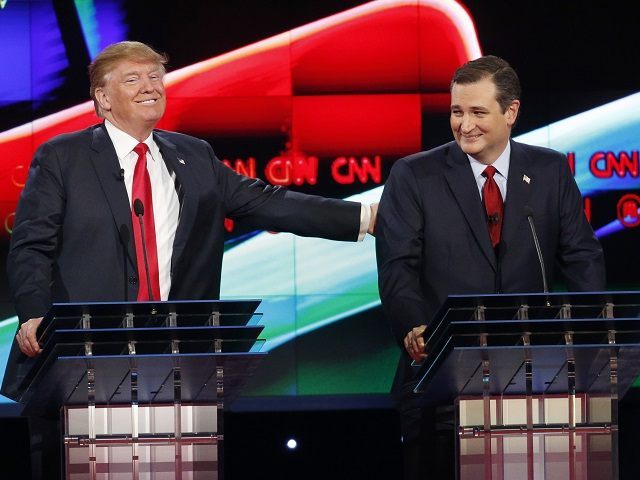The great arbiter of true conservatism, The New York Times, has now declared the modern Republican Party unfit for the mantle of its onetime leader, Ronald Reagan.
Elizabeth Williamson of the Times explained, in an article subtly titled, “A Party Reagan Wouldn’t Recognize”:
Led by Donald Trump, Ted Cruz, and Chris Christie, the fear-mongers projected an image of a diminished America that is grotesquely at odds with the way Americans have historically viewed themselves. The Republicans were also at odds with one of their heroes: former President Ronald Reagan, whom they credit with restoring American confidence at home and abroad, not only with his actions, but with his words. What follows is a comparison of a few of the candidates’ statements with those uttered by Mr. Reagan in his farewell speech to the nation as he left office in 1988.
Well, no. It turns out that Reagan was perfectly happy casting 1980 incumbent Jimmy Carter and 1984 rival Walter Mondale as diminishing American power both at home and abroad. And the media painted Reagan as a dangerous threat to American security, unstable and untrustworthy. Sounds rather familiar, doesn’t it?
But Williamson goes on to complain that Donald Trump doesn’t sound like Reagan – after all, Trump spoke last night about quashing an immigrant wave because “we are not talking about isolation, we’re talking about security,” while Reagan once talked about a sailor picked up in the South China Sea who praised an American sailor as a “freedom man.”
Reagan was extraordinarily pro-immigration – so much so that in 1980 he stated that he opposed the building of a border fence because he didn’t want to restrict those who would cross the border to find employment. But Reagan never would have stood for thousands of unvetted possible security risks entering the country. Reagan’s issues with border security were economic ones – and his amnesty plan of 1986 was a total failure anyway.
Williamson next turns to Republican rhetoric about the state of the nation, quoting Marco Rubio, Trump, and Jeb Bush also talking about Obama’s policies being a disaster for the country, and the millions of Americans who feel left behind by Obama’s brand of radical change. She then quotes Reagan talking about the heart of a “great nation.”
She neglects to mention that Ronald Reagan famously said of his 1980 opponent, Carter, “The Carter record is a litany of despair, of broken promises, of sacred trusts abandoned and forgotten… A recession is when your neighbor loses his job. A depression is when you lose yours. Recovery is when Jimmy Carter loses his.”
She turns to Ben Carson and Rubio talking about the threat of ISIS and radical Islam – then quotes Reagan saying, “the future will always be ours.” She forgets that Reagan termed the Soviet Union the “evil empire,” joked openly about bombing them, and said that they had to be defeated, not simply accepted as a part of the landscape.
Next, Williamson quotes Ted Cruz and Chris Christie talking about the threat of Islamic terrorism, and how it presents a threat to our cities and our children. She contrasts that with Reagan’s “shining city upon a hill” speech. She did not quote Reagan upon his bombing of Muammar Qaddafi in 1986: “There should be no place on earth where terrorists can rest and train and perfect their deadly skills. I meant it. I said that we would act with others if possible to ensure that terrorists have no sanctuary anywhere. Tonight, we have.”
Williamson concludes by quoting Republican moderator Hugh Hewitt, who asked at one point:
This is the Christmas dinner debate. This will be the debate that Americans talk about at Christmas. And thus far, in the first 10 minutes, we haven’t heard a lot about Ronald Reagan’s city on a hill. We’ve heard a lot about keeping Americans out or keeping Americans safe and everyone else out. Is this what you want the party to stand for?
But when it came to national security, Reagan didn’t talk too much about the shining city on the hill. He talked about defeating our enemies. He reserved his vision of the shining city on the hill for discussions of our values and character. When it came to defeating America’s enemies, he was far less focused on rhetoric and far more focused on characterizing our enemies properly and then unleashing the power of the country to defeat them.
Ben Shapiro is Senior Editor-At-Large of Breitbart News, Editor-in-Chief of DailyWire.com, and The New York Times bestselling author, most recently, of the book, The People vs. Barack Obama: The Criminal Case Against The Obama Administration (Threshold Editions, June 10, 2014). Follow Ben Shapiro on Twitter @benshapiro.

COMMENTS
Please let us know if you're having issues with commenting.